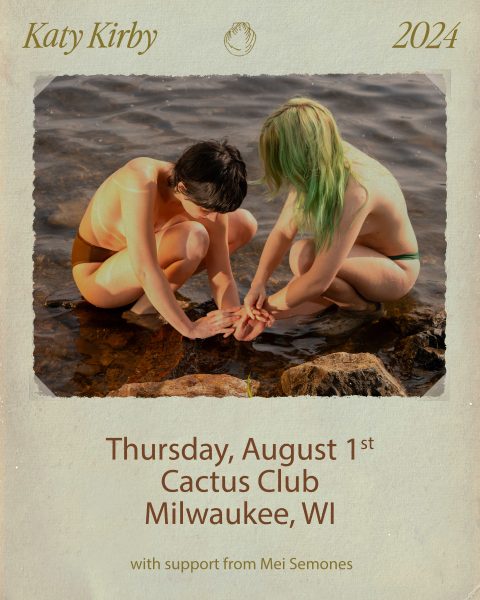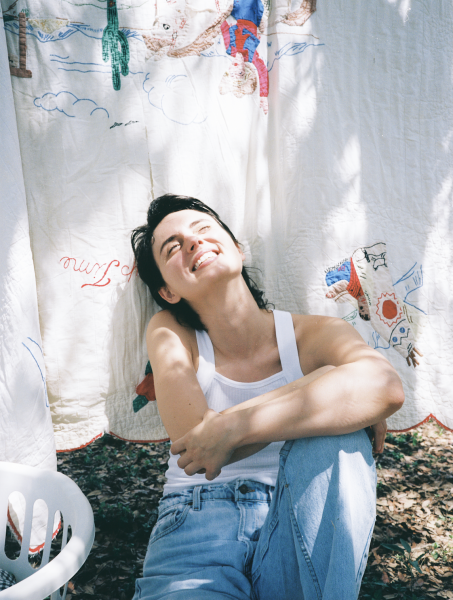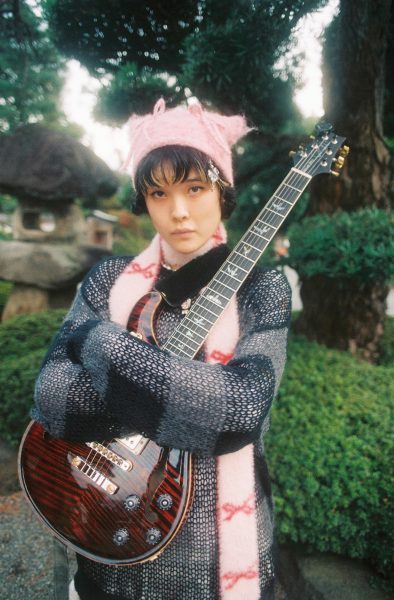Show Lineup
Katy Kirby
(Nashville, TN)
Katy Kirby is a songwriter and indie rock practitioner with an affinity for unspoken rules, misunderstanding, and boredom. She was born, raised, and homeschooled by two ex-cheerleaders in small-town Texas and started singing in church, amidst the pasteurized-pop choruses of evangelical worship, about which she shares acute perceptions.
Like many bible belt late-millennials, Katy grew up on a strict diet of this dependably uncool genre. She recalls, “In the mid-90s, the American evangelical church was making music of an extraordinarily digestible, almost unprecedentedly easy-listening kind, stylistically void and vaguely dubbed Christian Contemporary Music, or CCM. It was pop that wasn’t quite pop, determinedly hanging on to the openhearted melodies of a decade prior, straightforward so as to be easily memorable, and in a key that an average churchgoer could sing along to.”
Accordingly, Cool Dry Place finds her dismantling it. “I can hear myself negotiating with that worship-ish music, fighting that deeply internalized impulse to make things that are super pleasant or approachable.” She hasn’t fully overcome the itch to please, but to a listener’s benefit. Instead of eradicating the pop sensibilities of her past, she warps them, lacing sugary hooks with sneaky, virulent rage, twisting affectionate tones into matter-of-fact reproach, and planting seemingly serene melodies with sonic jabs. The fun is in the clash.
Take “Portals” for example, a song of country-traditional chords and gentle vocal delivery that might have easily materialized as a placid ballad. Rather, Katy drenched its soft core in metallic noise and oscillating string textures. You can imagine someone bussing glassware from a table nearby, while Katy sits you down at a booth and trusts you with notes on a pre-breakup, the first couple of minutes living in the last part of a relationship.
With the same masterful trickery, “Traffic!” juxtaposes sound and sentiment, a jittery combination of saturated pop and Rainforest Cafe’ faux-tropicalia projecting (arguably false) sympathy toward a character absorbed in his own self-inflicted misery. Though her chorus wails jubilant, Katy weaponizes its catchy gusts to criticize privilege: “Nobody has it better than you.”
Katy’s residual ties to church life are audial alone; spiritually, she has worked to detach. “Until a couple of years ago, I spent much of my time falling out of love with God. My life until then hadn’t just been participating in a church so much as completely, profoundly believing—youth group, sure, but also a few attempts to cast out demons. Learning how to think or see things outside of that very intense, clarified space was like rewiring my brain. I guess that if there’s one thing that unifies these songs, it’s that they’re figuring out what to do, or how to love, or who to rely on outside of that context.”
The nine tracks that make up Cool Dry Place are miscellaneous in subject (motherhood, late capitalism, disintegrating relationships,) but unified by the angle from which they’re told, from a person re-learning to process life with intense attention. Each song is a catalog of fragments, the number of segments in an orange or the cut of an obsessively-worn shirt, distilled into meditations on the bizarre and microscopic exchanges that make up modern life — a relationship splintering, an uncomfortable pause, an understanding finally found. These emotional dioramas are moderated by the angular storytelling that unites Gillian Welch and Phoebe Bridgers, a favor for the conventions of short fiction over confession.
Kirby readily admits that Cool Dry Place feels like a late-bloomer’s record. “These songs were written and recorded over an embarrassingly long period of time, by a few different versions of myself.” The album began in Nashville years ago. Kirby had moved there for college, changed majors five times, briefly dropped out, and finally graduated with a handful of songs, a circle of artistic allies, an amorphous collection of leftist beliefs, and an English degree. She flailed in the solo-artist archetype for a period of time before turning to friends capable of constructing a satisfying full length. Kirby, Alberto, Hunt, Logan, and Zook spent over a year carving out bits of spare time to record in bedroom studios, living rooms, and a now-demolished former residence of Keith Urban. Tracking was finally completed over Thanksgiving 2019 at Kirby’s childhood home outside of Austin.
As its title track flips the advisory on a package of Tylenol into a hymn to human need for protection and acceptance, Cool Dry Place asks a listener to embrace the precious and contradictory nature of being a person. Katy Kirby is an artist simultaneously tender and angry, vulnerable and protected, calculated and resigned.
Mei Semones
(NYC)
“No second-guessing, no overthinking. The way I want to live my life is by doing the things that are important to me, and I think everyone should live that way,” says Mei Semones of her strengthened self-assurance. Through continuously honing in on her signature fusion of indie rock, bossa nova, jazz and chamber pop in a way that highlights her technical prowess on guitar, the 24-year-old Brooklyn-based songwriter and guitarist is quickly establishing herself as an innovative musical force. Since the release of her acclaimed 2024 Kabutomushi EP, a series of lushly orchestrated reflections on love in its many stages, Mei has gone on to tour extensively across the US, cultivate a dedicated following, and write and record her highly anticipated debut album, Animaru. Inspired by the Japanese pronunciation of the word “animal” in Japanese, Animaru is the embodiment of Mei’s deeper trust in her instincts – a collection of musically impressive tracks that see Mei sounding more adventurous, more vulnerable and more confident than ever before.
Mei’s newfound assertiveness comes in part from her experiences in the past year, as 2024 was a transformative year for the Mei Semones band. They shared bills with the likes of Liana Flores, Elephant Gym and Kara Jackson, among others, and Mei transitioned to doing music full-time. Amidst the frequent touring, Mei and her five-piece band recorded the album in the summer of 2024 at Ashlawn Recording Company, a farm studio in Connecticut operated by their friend Charles Dahlke. To these sessions, she brought a batch of tracks that, not unlike Kabutomushi, are sophisticated declarations of non-romantic love: love of life (“Dumb Feeling”), love of family (“Zarigani”), love of music and her guitar (“Tora Moyo”). Animaru exemplifies Mei’s enchantingly wide range as a songwriter and musician, including some of the most challenging and most straightforward songs Mei has ever written.
Though her music might inherently evoke feelings of romance and softness, the crux of the album lies in Mei and her band’s skillful balance of tension and release. Often within individual tracks, there will be moments of pared-back acoustic guitar adorned by Mei’s infectious vocalizations that, in a moment’s notice, transform into orchestral swells of sweeping strings and complex guitar rhythms. Album opener “Dumb Feeling” is a prime example, a bossa/samba blend complete with indie rock sensibilities in the choruses as Mei details her contentment with her life in New York City. Mei actively seeks out musical challenges throughout Animaru, like on “I can do what I want,” the album’s most technically ambitious track. But she still manages to make the quickly cascading guitar harmonics and odd meters sound like a breeze to play, her breathy, lilting voice cutting through the track’s energetic dynamics. It epitomizes the album as a whole – she sings of doing things her own way, on her own terms, in hopes of inspiring others to make the same active switch in their own lives.
The simpler moments on Animaru are equally as captivating as when Mei is shredding on guitar or her bandmates are carrying out an intricate arrangement. “Donguri,” a stripped-down jazz duo performance between acoustic guitar and upright bass, is the simplest song Mei has ever written, brought to life by Mei sweetly chronicling (mostly in Japanese) what she imagines life would be like as a woodland creature living in the forest. The album’s penultimate track also encompasses themes relating to the titular “animaru.” Translating to “crayfish,” the bright, effervescent “Zarigani” is a nostalgic expression of love for her twin sister, with Mei singing “We’ll always have each other / I love you like my guitar / I love you like no other.” Family is one of the primary loves of Mei’s life, with her mom, Seiko Semones, making all of her album and single artwork. Despite Animaru being a statement of Mei’s autonomy and confidence at this point in her life, it’s the various loves that she surrounds herself with – her family, her friends, her band, her music – that empower her to do things her own way.
Animaru, the debut album by Mei Semones, is out on May 2, 2025, on Bayonet Records.
Maximiano
(Milwaukee, WI)
Maximiano’s music is rarely about just one emotion, moment, or person. Their debut album, “The Real Truth,” instead explores the way that experience flows through periods of growth and change. The songs shimmer, echo, and glide through tales of memory and identity that Piet Levy of The Milwaukee Journal Sentinel called “one of the most piercing and emotionally resonant collections of songs from a Milwaukee artist of the year… a towering achievement.”
The album, which Maximiano wrote, produced, arranged, recorded, and mixed, is adorned with a variety of sounds; piano, pedal steel, flute, clarinet, and more elevate the indie-folk core. With an all-star band of Milwaukee musicians (including members of Field Report, PHOX, Old Pup, and Ellie Jackson), the vulnerable americana-folk songs swell to cathartic, indie-rock peaks. Riding the waves of this folkestra, Maximiano sings tenderly but urgently about taking chances, missed opportunities, and reevaluating memories. The result is a flowing, expressive sound that, according to Erin Wolf, music director at 88.9 Radio Milwaukee, “captures the beauty that often comes from the newfound wisdom accrued in your stumbling, youngest years.”
“The Real Truth” is a lush, courageous, and ambitious first record from an artist poised to take up the lineage of earnest, folk-influenced singer-songwriters. Though their music will appeal to fans of Adrianne Lenker, Songs:Ohia, Sufjan Stevens, and Elliott Smith, the real truth is that there is no one quite like Maximiano.




